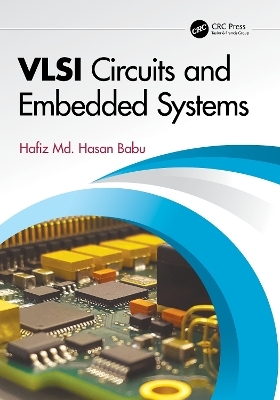
VLSI Circuits and Embedded Systems
CRC Press (Verlag)
978-1-032-21610-2 (ISBN)
Very Large-Scale Integration (VLSI) creates an integrated circuit (IC) by combining thousands of transistors into a single chip. While designing a circuit, reduction of power consumption is a great challenge. VLSI designs reduce the size of circuits which eventually reduces the power consumption of the devices. However, it increases the complexity of the digital system. Therefore, computer-aided design tools are introduced into hardware design processes.
Unlike the general-purpose computer, an embedded system is engineered to manage a wide range of processing tasks. Single or multiple processing cores manage embedded systems in the form of microcontrollers, digital signal processors, field-programmable gate arrays, and application-specific integrated circuits. Security threats have become a significant issue since most embedded systems lack security even more than personal computers. Many embedded systems hacking tools are readily available on the internet. Hacking in the PDAs and modems is a pervasive example of embedded systems hacking.
This book explores the designs of VLSI circuits and embedded systems. These two vast topics are divided into four parts. In the book's first part, the Decision Diagrams (DD) have been covered. DDs have extensively used Computer-Aided Design (CAD) software to synthesize circuits and formal verification. The book's second part mainly covers the design architectures of Multiple-Valued Logic (MVL) Circuits. MVL circuits offer several potential opportunities to improve present VLSI circuit designs. The book's third part deals with Programmable Logic Devices (PLD). PLDs can be programmed to incorporate a complex logic function within a single IC for VLSI circuits and Embedded Systems. The fourth part of the book concentrates on the design architectures of Complex Digital Circuits of Embedded Systems. As a whole, from this book, core researchers, academicians, and students will get the complete picture of VLSI Circuits and Embedded Systems and their applications.
Professor Dr. Hafiz Md. Hasan Babu is currently working as a Professor in the Department of Computer Science and Engineering, University of Dhaka, Bangladesh. He is also the former Chairman of the same department. Recently, he has completed his tenured as Pro-Vice-Chancellor of National University, Bangladesh, where he was on deputation from the Department of Computer Science and Engineering, University of Dhaka, Bangladesh. For his excellent academic and administrative capability, he also served as the Professor and founding Chairman of the Department of Robotics and Mechatronics Engineering, University of Dhaka, Bangladesh. He served as a World Bank Senior Consultant and General Manager of the Department of the Information Technology & the Department of Management Information Systems of Janata Bank Limited, Bangladesh. Dr. Hasan Babu was the World Bank Resident Information Technology Expert of the Supreme Court Project Implementation Committee, Supreme Court of Bangladesh. He was also the Information Technology Consultant of Health Economics Unit and the Ministry of Health and Family Welfare in the project "SSK (Shasthyo Shurokhsha Karmasuchi) and Social Health Protection Scheme" under the direct supervision and funding of German Financial Cooperation through KfW.
Part-1: Decision Diagrams (DDs)
Chapter 1: Shared Multi-Terminal Binary Decision Diagrams
Chapter 2: Multiple-Output Functions
Chapter 3: Shared Multiple-Valued DDs for Multiple-Output Functions
Chapter 4: Heuristics to Minimize Multiple-Valued DDs
Chapter 5: TDM Realizations of Multiple-Output Functions
Chapter 6: Multiple-Output Switching Functions
Part-2: An Overview About Design Architectures of Multiple-Valued Circuits
Chapter 7: Multiple-Valued Flip-Flops using Pass Transistor Logic
Chapter 8: Voltage-Mode Pass Transistor-based Multi-Valued Multiple-Output Logic Circuits
Chapter 9: Multiple-Valued Input Binary-Valued Output Functions
Chapter 10: Digital Fuzzy Operations using Multi-Valued Fredkin Gates
Chapter 11: Multiple-Valued Multiple-Output Logic Expressions using LUT
Part-3: Programmable Logic Devices
Chapter 12: LUT-Based Matrix Multiplication Using Neural Networks
Chapter 13: Easily Testable PLAs using Pass Transistor Logic
Chapter 14: Genetic Algorithm for Input Assignment for Decoded-PLAs
Chapter 15: FPGA-based Multiplier using LUT Merging Theorem
Chapter 16: Look-Up Table-based Binary Coded Decimal Adder
Chapter 17: Place and Route Algorithm for Field Programmable Gate Array
Chapter 18: LUT-based BCD Multiplier Design
Chapter 19: LUT-based Matrix Multiplier Circuit using Pigeonhole Principle
Chapter 20: BCD Adder using a LUT-based Field Programmable Gate Array
Chapter 21: Generic Complex Programmable Logic Device Board
Chapter 22: FPGA-based Programmable Logic Controller Part-IV: Design Architectures of Advanced Digital Circuits
Chapter 23: Parallel Computation of Quotients and Partial Remainders to Design Divider Circuits
Chapter 24: Synthesis of Boolean Functions using TANT Networks
Chapter 25: Asymmetric High Radix Signed Digital Adder using Neural Networks
Chapter 26: Wrapper/TAM Co-Optimization and Constrained Test Scheduling for SOCs using Rectangle Bin Packing
Chapter 27: Static Random Access Memory using Memristor
Chapter 28: A Fault Tolerant Approach to Microprocessor Design
Chapter 29: Applications of VLSI Circuits and Embedded Systems
| Erscheinungsdatum | 20.09.2024 |
|---|---|
| Zusatzinfo | 49 Tables, black and white; 244 Line drawings, black and white; 30 Halftones, black and white; 274 Illustrations, black and white |
| Verlagsort | London |
| Sprache | englisch |
| Maße | 178 x 254 mm |
| Gewicht | 943 g |
| Themenwelt | Technik ► Elektrotechnik / Energietechnik |
| ISBN-10 | 1-032-21610-7 / 1032216107 |
| ISBN-13 | 978-1-032-21610-2 / 9781032216102 |
| Zustand | Neuware |
| Haben Sie eine Frage zum Produkt? |
aus dem Bereich


